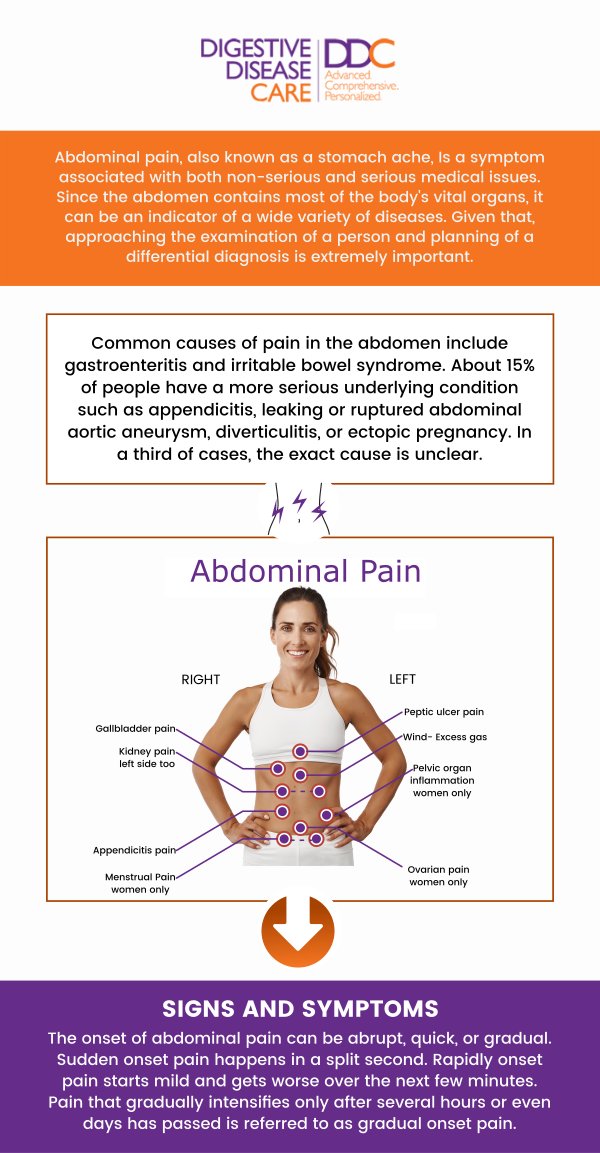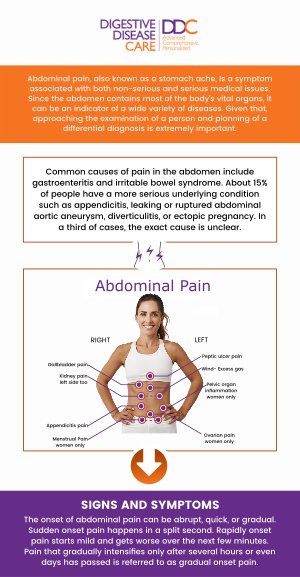Lower Abdominal Pain Treatment Specialist Q&A
Lower abdominal pain can result from digestive issues, infections, or other underlying health conditions. Symptoms may range from mild discomfort to severe, persistent pain that requires medical attention. At Digestive Disease Care, our board-certified gastroenterologists provide thorough evaluation and personalized treatment to restore your digestive health. For more information, contact us today or schedule an appointment online. We have convenient locations to serve you in Babylon NY, East Setauket NY, Forest Hills NY, Jericho NY, Lake Success NY, Melville NY, Mineola NY, Massapequa NY, New Hyde Park NY, and Riverhead NY.


Table of Contents:
What are the most common causes of lower abdominal pain?
What is the difference between acute and chronic lower abdominal pain?
When should I seek medical attention for lower abdominal pain?
What is the role of appendicitis in lower abdominal pain?
Lower abdominal pain can affect both men and women and often signals a wide range of underlying conditions, from mild digestive issues to more serious medical concerns. Understanding the most common causes is important for determining when to seek medical care and how to address the discomfort effectively.
The most common causes of lower abdominal pain include:
• Digestive issues: Constipation, gas, indigestion, or irritable bowel syndrome (IBS).
• Infections: Urinary tract infections (UTIs) or gastrointestinal infections.
• Reproductive health conditions: Menstrual cramps, ovarian cysts, or endometriosis in women; prostate problems in men.
• Appendicitis: Sudden sharp pain, often starting near the navel and shifting to the lower right side.
• Hernias: Pain from tissue or organ pushing through a weak spot in the abdominal wall.
• Kidney problems: Kidney stones or infections that radiate to the lower abdomen.
• Inflammatory conditions: Crohn’s disease, ulcerative colitis, or diverticulitis.
Since the causes range from minor to potentially life-threatening, persistent or severe lower abdominal pain should be evaluated by a healthcare professional. Early diagnosis and treatment can prevent complications and ensure proper care.
Lower abdominal pain can be classified as acute or chronic, and understanding the difference is important for proper diagnosis and treatment. The distinction lies in how quickly the pain develops, how long it lasts, and the underlying conditions that may be responsible.
Key differences between acute and chronic lower abdominal pain include:
• Onset: Acute pain develops suddenly and often intensely, while chronic pain develops gradually or persists over a longer period.
• Duration: Acute pain usually lasts a few hours to days, whereas chronic pain persists for weeks, months, or even longer.
• Causes: Acute pain is often linked to urgent conditions like appendicitis, kidney stones, or infections. Chronic pain may stem from long-term issues such as irritable bowel syndrome (IBS), endometriosis, or inflammatory bowel disease.
• Severity: Acute pain is typically sharp and severe, prompting immediate attention. Chronic pain may be dull, intermittent, or recurrent.
• Treatment urgency: Acute pain often requires urgent evaluation to rule out emergencies, while chronic pain requires ongoing management and lifestyle adjustments.
Recognizing whether lower abdominal pain is acute or chronic helps healthcare providers identify the cause and create an effective treatment plan. Timely medical evaluation is always recommended for persistent or severe pain.
Lower abdominal pain can sometimes be mild and short-lived, but in other cases, it may signal a more serious underlying condition. Knowing when to seek medical attention is important to prevent complications and ensure proper treatment.
You should seek medical attention for lower abdominal pain if you experience:
• Sudden, severe, or worsening pain that does not improve with rest.
• Pain accompanied by fever, chills, or sweating may indicate infection.
• Persistent nausea or vomiting, especially if you cannot keep fluids down.
• Jaundice (yellowing of the skin or eyes), suggesting possible liver involvement.
• Pain with bloating or swelling, which may indicate fluid buildup or obstruction.
• Changes in bowel habits, such as prolonged constipation, diarrhea, or blood in the stool.
• Urinary symptoms, including burning, urgency, or blood in the urine.
• History of chronic conditions, like Crohn’s disease or endometriosis, with worsening pain.
If your lower abdominal pain is intense, persistent, or linked with other concerning symptoms, prompt medical evaluation is essential. Early diagnosis can help prevent complications and ensure timely, effective care.
Appendicitis plays a significant role in lower abdominal pain because it is one of the most common causes of sudden, severe discomfort in this area. The appendix is a small pouch located in the lower right side of the abdomen, and when it becomes inflamed or infected, it produces acute pain that requires immediate medical attention.
The role of appendicitis in lower abdominal pain includes:
• Sudden onset of pain, often starting near the belly button and shifting to the lower right abdomen.
• Sharp and worsening pain that intensifies over hours.
• Associated symptoms such as nausea, vomiting, fever, and loss of appetite.
• Tenderness on examination, especially when pressure is applied to the lower right side.
• Risk of complications, including rupture of the appendix, which can lead to a life-threatening infection in the abdominal cavity.
Because appendicitis is a medical emergency, recognizing its signs is critical. If lower abdominal pain is severe, persistent, and accompanied by other symptoms, prompt evaluation by a healthcare provider is essential to prevent serious complications. For more information, contact us today or schedule an appointment online. We have convenient locations to serve you in Babylon NY, East Setauket NY, Forest Hills NY, Jericho NY, Lake Success NY, Melville NY, Mineola NY, Massapequa NY, New Hyde Park NY, and Riverhead NY and surrounding areas.

Check Out Our 5 Star Reviews


Additional Services You May Like

Additional Services You May Like
- Abdominal Pain
- Acid Reflux
- Barretts Esophagus
- Bloating
- Capsule Endoscopy
- Celiac Disease
- Colon Cancer Screening
- Colonoscopy
- Constipation
- Crohns Disease
- Diarrhea
- Diverticulitis
- Esophageal PH Monitoring
- Fatty Liver
- Fibroscan
- Gallstones
- Gastroenterologist
- Gastric Chest Pain
- Gluten Intolerance
- Hemorrhoid
- Hemorrhoid Banding
- Hepatitis
- Irritable Bowel Syndrome
- Lactose Intolerance
- Pancreatitis
- Polyps
- Rectal Bleeding
- Stomach
- Ulcerative Colitis
- GI Urgent Care





